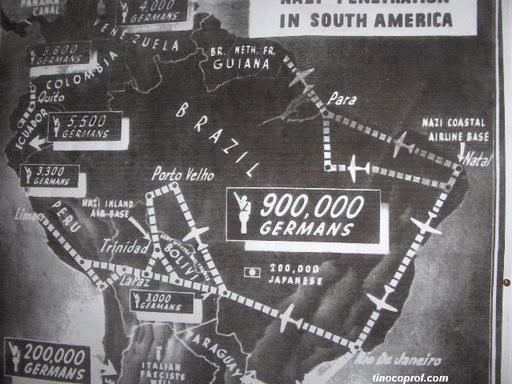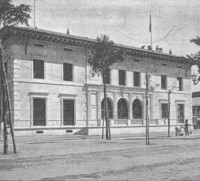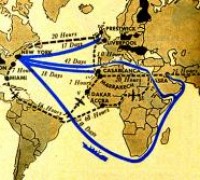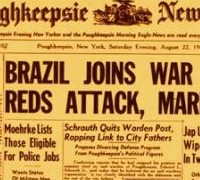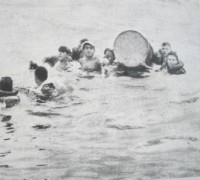- THE HARD ROAD TO WAR
11)RIO CONFERENCE JAN 42
Following the Japanese attack on Pearl Harbor, President Roosevelt sponsored the third conference for consultation of Latin American foreign ministers which took place at Rio de Janeiro, Brazil from 15th to 28th January 1942.
The primary objective of the conference was the unanimous approval of a resolution recommending the severance of all diplomatic and economic ties of American countries with Axis powers. In the end in view of the Chilean and Argentinean refusal to follow suit, the council draft a more moderate resolution, a first step to war, which recommended the breaking of diplomatic relations only.
The question involving Brazilian demands for arms to the United States was the fulcrum of all misunderstandings and disagreements between the two countries in the first stages of the war. The Roosevelt administration saw with grounded suspicions the fact that Brazil was linked to Axis powers by strong ties both economical and diplomatic, especially with Germany, therefore remaining reluctant before Brazilian government hard pressing for arms supply.
To say the least, Brazilian government had ordered to German Krupp nothing less than 1080 coastal and antiaircraft batteries. After all, the conference if not succeeded for American standpoint at least approved a series of resolutions that fostered the collaboration of all Latin American nations with the United States war effort.
Latin Americans from then on, were deeply committed to open their vast natural resources to provide all necessary strategic raw material for the US war industry, to create adequate conditions for the free traffic of financial assets, to increment Inter American commercial relations, to develop the strategic materials production, to keep the shipping lanes free, to control all financial operations of Axis, to increase mutual investments and exert a tight grip in internal front to stave off any danger to the political agreements made with the US.
The fact that no military agreement have been achieved during the conference, spawned great disappointment among certain niches of Brazilian armed forces eager for an effective participation on allied side in the incoming world conflict. On this regard, the resolution was very limited itself and proposed the establishment of a bureau of studies on the continental defense, i.e. an organism which superficially aimed to encourage the continental solidarity in military sphere, otherwise to assume a relevant defensive role in the region.
During the conference, sub secretary Summers Wells announced that Peru, Bolivia and Paraguay decided to support the U S led declaration which recommended the breaking of diplomatic relations by all South American nations with Axis powers in exchange of economical aid and the immediate shipment of military equipment. He stressed in the occasion the importance of Brazil in the continental strategy of defense and by inference the country could not be placed in secondary position as a host for American troops deployed in its territory.
Summer Wells also emphasized Brazil was a friend and an important ally of US and had rights to receive through lend – lease all adequate military equipment for its needs like fighter aircrafts, patrol planes and medium bombers, tanks and coastal artillery suffice to provide northeast coastline with a minimum capability, whose defense seemed absolutely vital and also to forestall any landing attempt by Axis.
Roosevelt informed on the correctness of his sub secretary positions and agreed with Brazilian demands although halfheartedly. As part of his strategy of negotiation of Brazilian alignment with the U S, President Vargas, delayed to the very last minute the announcement of the breaking of diplomatic relations with Axis powers.
This South American map showed how US Administration viewed the situation in the continent and the German influence in several countries.
When the word came from president Roosevelt assuring his compromise for supplying the armed forces with update equipment, Brazil then finally severed diplomatic relations with Germany, Italy and Japan in the final day of the conference on January 28th 1942. From then on German reprisals against Brazil took place when several merchantmen were sunk along US east coast. Late in August German submarines tighten the grip on shipping lanes when U-boat U-507 alone sank 5 Brazilian merchants on the coast of the state of Sergipe, killing hundreds of people.
The act led Brazilian President Vargas to declare a state of war against Axis powers. President Roosevelt took in earnest the early warnings from his advisors and undertook a decisive diplomatic pressure on Brazilian government for the cession of the bases in northeast as well as harnessing its economy to the arsenal of democracies on the long and strenuous war effort. For American strategists, the possibility of a German force landing at Natal or Recife would be inconceivable.
After the exchange of war declarations between the United States, Germany, and Italy on 11 December, Brazil began to curtail Axis activities by such measures as freezing credits, creating some difficulties for News agencies and finally closing the activities of German controlled CONDOR airline and Italian L.A.T.I. These steps were did not suffice to protect Northeast region.
Brazilian Army garrisons and newly created F.A.B (Air Force) squadrons then stationed in the Northeast had not acquired the necessary degree of preparedness and equipment to cope with an attack by any modern force, and the United States Navy patrol Squadrons based in the region had neither adequate nor suitable forces for the defense of land and naval bases.
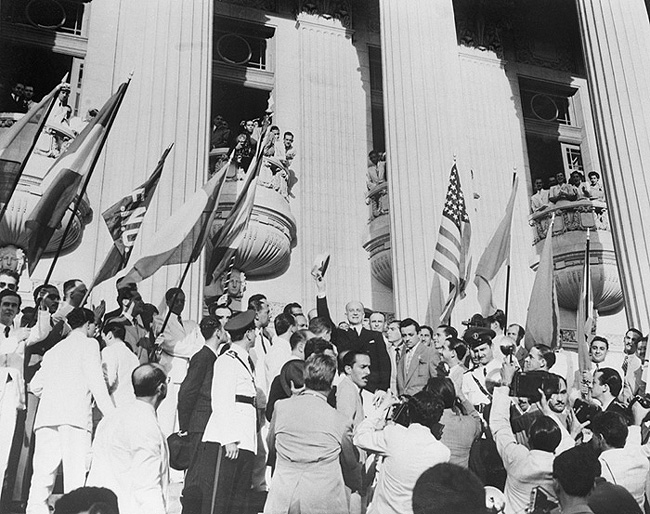
Summer Welles waves his hat in the midst of a crowd at the Rio Conference, Jan 1942. Corbis, U63467. Photo. http://www.gutenberg-e.org/osc01/images/osc04c.html
https://www.youtube.com/watch?v=OMw7Wj83yYY
M/S of Mr Sumner Welles, United States Under Secretary of State, arriving at the Pan-American Conference. He is greeted by officials. Various shots of Mr Sumner making a speech before the Council of the Latin-American Republics. He talks of there being no peace until Hitlerism and its monstrous parasites are utterly obliterated (applause), and until oppression and Japanese militarists have been taught, in the only language they understand (applause), that they will never again be afforded the opportunity of wrecking the lives of generation upon generation of men and women in every quarter of the globe.
